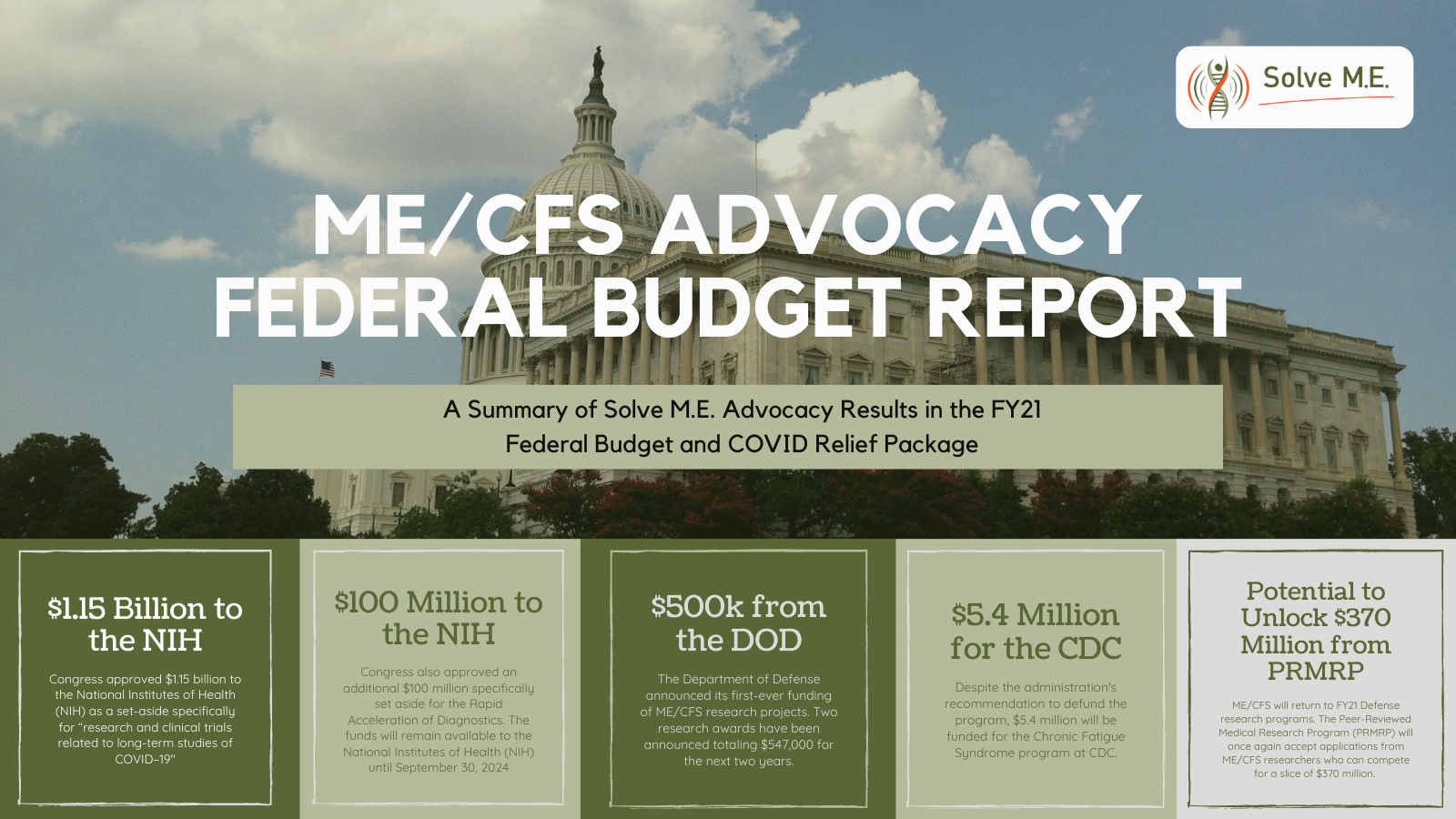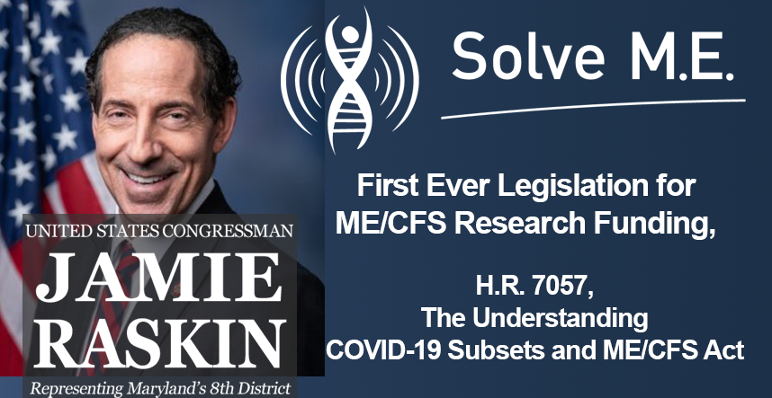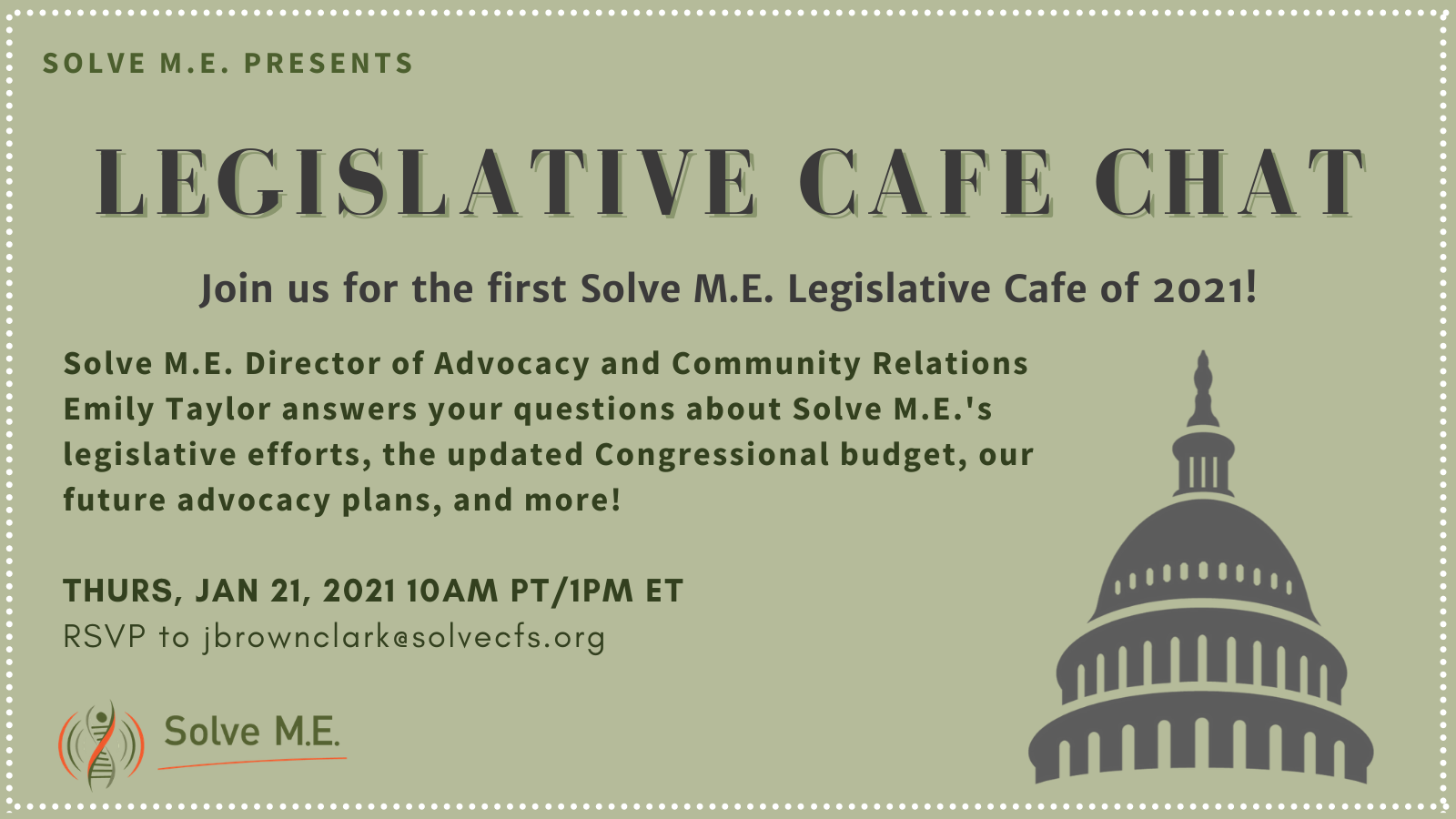
After an eight-month politically-charged rollercoaster, Congress ended 2020 by passing a $900 billion COVID-relief package and a $1.4 trillion FY21 budget simultaneously. This giant bill, totaling over 5,500 pages, was signed into law on December 27th. It contained direct payments to citizens, expanded unemployment benefits, included new provisions for clinical trials, and most importantly, new opportunities and actions for Long-COVID, which will directly help ME/CFS.
Here’s what the 116th Congress did for ME/CFS:
$1.25 Billion for NIH Long-COVID research, diagnostics,
and clinical trials (December 2020)
In addition to a $2 billion budget increase, Congress approved an additional $1.15 billion to the National Institutes of Health (NIH) as a set-aside specifically for “research and clinical trials related to long-term studies of COVID–19” with an additional $100 million specifically set aside for the Rapid Acceleration of Diagnostics. The funds will remain available to the NIH until September 30, 2024.
Congress clearly communicated that these funds are “prescribed” exclusively for Long-COVID (referred to by government leaders as “post-acute COVID syndrome”) and the NIH has confirmed this intention. In a public statement earlier this week, Dr. Larry Tabak, the Principal Deputy Director of the NIH, again confirmed that these funds appropriated by Congress are “strictly for post-acute COVID syndrome, including Multisystem Inflammatory Syndrome in Children (MIS-C).” Dr. Tabak also confirmed that there will be a trans-NIH approach to the use of these funds, but no specific plans or further details have been released at this time. Asked specifically about this $1.15 billion dedicated to “long-term” studies of COVID, the NIH official said:
“This is a rather prescribed resource set to look at post-acute COVID syndrome. And, that will include the so-called MIS-C [Multisystem Inflammatory Syndrome in Children] we observe in children. So, we are working on a trans-NIH approach to this very important question. But, that resource is prescribed. Depending on the final form of the studies, that’s how we will determine the allocation of those specific funds. But it is focused on that specific problem, a broad problem [post-acute COVID syndrome], but never-the-less a specific problem.”
—Dr. Larry Tabak, Research!America Alliance Member Meeting, January 12, 2021
This quote (above) from the top NIH official is found at the 15:30 minute mark in this video from a Research!America meeting.
Last month, Solve M.E. led the charge for federally funded research into Long-COVID and myalgic encephalomyelitis (ME) — previously known as chronic fatigue syndrome (CFS). We authored this letter, joined by 20 leading chronic disease and health equity stakeholders, and met with dozens of legislators to discuss these federal funding needs.
First-Ever ME/CFS Research Legislation Introduced (June 2020)

Thanks to your hard work during ME/CFS Advocacy Week, Representative Jaime Raskin (MD-08) introduced H.R. 7057, The Understanding COVID-19 Subsets and ME/CFS Act.
This landmark legislation authorized $60 million over the next four years to expand NIH research into post-viral ME/CFS and also empowered the Department of Health and Human Services (HHS) to provide for public awareness and education campaigns to increase understanding of ME/CFS, with an emphasis on early diagnosis. Additionally, the legislation included mandatory reports to Congress on the progress of implementing the expanded research program.
The bill had an impressive 51 bipartisan co-sponsors, but the Energy and Commerce Subcommittee on Health did not decide to take up H.R. 7057.
As the 116th Congress ended, Congressional champions tried one last “hail Mary” play to pass H.R. 7057. Converting the legislation into an appropriations request, ME/CFS champions resubmitted the request for post-COVID ME/CFS research funding for consideration. Unfortunately, this attempt and the bill both failed to pass in December 2020.
From Department of Defense: Over $500,000 in new ME/CFS research investments (December 2020)
After three years of hard work and over 10,000 community emails to Congress, Solve M.E. successfully added ME/CFS as an eligible topic area for the Peer Reviewed Medical Research Program (PRMRP). This program received $350 million in FY 2020, for which ME/CFS researchers submitted seven compliant applications. Two applications were funded, totaling over $547,000 in new federal ME/CFS research funding.
Bipartisan Women’s Caucus Features ME/CFS patient and researcher (August 2020)
As part of our collaboration with the Congressional Bipartisan Women’s Caucus, Miles for Migraine, and the Headache and Migraine Policy Forum, Solve M.E. hosted a virtual congressional briefing on COVID-19, ME/CFS, and Migraine Disease.
Moderated by two-time Emmy nominated TV host, Jedediah Bila, “Women’s Chronic Illness During a Pandemic” was designed to educate members of Congress and their staff about COVID-19’s impacts on women’s clinical care and economic burdens through the experiences of women with ME/CFS and Migraine Disease. Featured panelists included Caucus Vice-Chair Representative Madeleine Dean, Dr. Nancy Klimas, Jamie Sanders, Dawn Buse (PhD), Ashanti Daniel (BSN, RN), and Joanna Kempner (PhD).
As emerging evidence indicates lasting health complications in COVID-19, how is the ongoing pandemic going to impact women with chronic illness? Through the lens of ME/CFS and Migraine Disease, this virtual roundtable explores the increasing economic burden, lagging clinical care, and potential scientific opportunity of women’s chronic illness during the current crisis.
Watch the virtual congressional briefing here.
Strong Advocacy Keeps DoD Research Funds Open (December 2020)
ME/CFS will return to FY21 Defense research programs. The Peer-Reviewed Medical Research Program (PRMRP) will once again accept applications from ME/CFS researchers who can compete for a slice of $370 million. The FY21 topic areas are expected to be publicly announced as early as February 2021.
Improving Congressional Oversight of Centers for Disease Control (July 2020)
Despite the administration’s recommendation to defund the program, $5.4 million will be funded for the Chronic Fatigue Syndrome program at the Centers for Disease Control (CDC). Solve M.E. worked closely with key congressional champions to strengthen congressional oversight of the CDC’s work, especially the Multisite Clinical Assessment of ME/CFS (MCAM) study, which has been operating for over 5 years without yielding results. The Committee included new language in H. Rept. 116-450 to communicate urgency and accelerate the CDC’s work, expressing concern “that there is a lack of information about ME/CFS onset and requests an update in the fiscal year 2022 Congressional Justification.”
Keeping up the Pressure on HHS
In last year’s budget, Solve M.E. was successful in securing one of the most aggressive Congressional actions to date. Congress instructed the Department of HHS to submit a plan within 90 DAYS that addresses 1) the crisis in ME/CFS clinical care, 2) accelerating drug development, and 3) facilitating improved interagency collaboration. HHS was never able to submit its report because it was interrupted by COVID-19.
This year, Congress reminded the HHS of its unmet reporting obligation and encouraged HHS to “foster interagency and stakeholder collaboration in addressing the crisis in ME/CFS clinical care and accelerating drug development for ME/CFS.”
New Provisions Open Clinical Trials to Millions (December 2020)
Lowering the costs and barriers for participation in clinical trials is a key priority for Solve M.E. For three years, Solve M.E. has endorsed and advocated for the passage of H.R. 913, The Clinical Treatment Act. Signed into law on Dec 27th, these new provisions will make it easier for Medicaid participants to participate in clinical trials and help reduce the cost of clinical trials. With these new laws in place, ME/CFS clinical trials will have additional resources. Most importantly, these provisions will help address racial and income disparities in clinical trial participants.
Join us for the first Solve M.E. Legislative Cafe Chat of 2021!
Solve M.E. Director of Advocacy and Community Relations Emily Taylor is hosting a new Legislative Cafe Chat on Thursday, January 21 at 10 am PST/1 PM EST to answer your questions about:
- What’s next for H.R. 7057?
- What does the recently approved budget and relief package entail?
- How will the recent changes in the political landscape impact our future advocacy efforts?
To RSVP, please send an email to jbrownclark@solvecfs.org.



